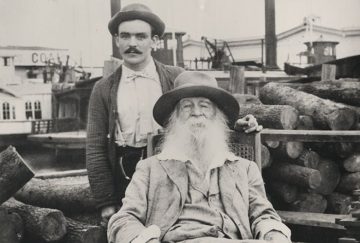Jeremy Lybarger in the Boston Review:
 “Whitman demonstrates part of his Americanness by placing cocksucking at the center of Leaves of Grass.” Gay liberationist Charles Shively—not one to mince words—wrote this in Calamus Lovers: Walt Whitman’s Working Class Camerados (1987), his revelatory, if sometimes risible, account of the poet’s queer egalitarianism. Whether cocksucking is central to Whitman’s book, or even uniquely American, is debatable; more pertinent is the implied connection between Whitman’s homosexuality and his patriotic fervor.
“Whitman demonstrates part of his Americanness by placing cocksucking at the center of Leaves of Grass.” Gay liberationist Charles Shively—not one to mince words—wrote this in Calamus Lovers: Walt Whitman’s Working Class Camerados (1987), his revelatory, if sometimes risible, account of the poet’s queer egalitarianism. Whether cocksucking is central to Whitman’s book, or even uniquely American, is debatable; more pertinent is the implied connection between Whitman’s homosexuality and his patriotic fervor.
That connection has been a bitter pill for some readers. Whitman’s contemporaries condemned what they saw as the unwholesome carnality of his work. Reviewing the original 1855 edition of Leaves of Grass, a critic at the New York Herald objected to Whitman’s “disgusting Priapism.” A review that same year in the New York Criterion rebuked the book as “a mass of stupid filth.” More colorfully, a New York Times critic accused Whitman of rooting “like a pig among a rotten garbage of licentious thoughts.” Even Emily Dickinson—herself no stranger to radical self-expression—weighed in, confiding in an 1862 letter to Thomas Higginson that she hadn’t read Leaves of Grass but had heard Whitman was “disgraceful.” Decades later, Willa Cather referred to Whitman as “that dirty old man.”
More here.
